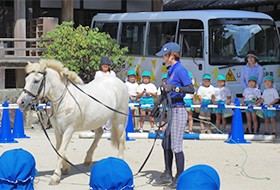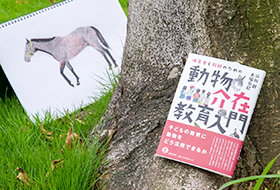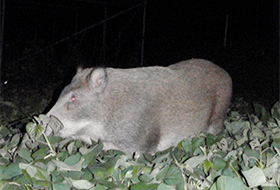 |
| |
 |
| |
|
Developing interest in the human-animal relationships, whereby new ways can be found for people and animals to harmoniously coexist
|
| |
 |
|
Professor Hajime Tanida began talking with a smile, saying, “The purpose of my research is to establish a favorable relationship between humans and animals in our daily lives.”
He studies various types of animals, such as livestock animals, wild animals, pet animals, stray animals (e.g. cats), and animals kept at kindergartens. Professor Tanida says that his field of specialty is the study of human-animal relationships, which aims to investigate and understand the relationships that people now have with respective animals, thereby pursuing a better way for humans and animals to coexist while considering the well-being of both parties.
Taking wild animals such as wild boar and deer as an example, what is highlighted is usually only their negative aspects as harmful animals that damage farm crops, so that the main focus is placed on developing methods to exterminate them. However, will everything be all right if we just exterminate these animals for short-term benefits or on the spur of the moment? Is there really no way for people and wildlife to coexist? |
|
| |
In Japan, the number of dogs and cats kept as pets is greater than that of children under 15, with the pet industry growing into a huge market of one trillion yen. In such a pet-oriented society, while many dogs and cats are taken care of very well as family members, it is also true that many others are being abandoned and killed.
Moreover, we cannot overlook the actual conditions of chickens and rabbits kept in kindergartens and elementary schools. Although these animals are kept to help educate the hearts of children, a considerable number of these animals soon die or are left untreated even though sick, due to the lack of proper management.
It can be said that the above examples are just the tip of the iceberg. He points out that the starting point for improving human-animal relationships is to understand the perspectives of both people and animals and recognize the meaning of each of their existences. |
|
 |
|
| |
|
Conducting fieldwork to study the subjects in details, by using all the physical senses
|
| |
 |
|
The basics of his research reside in observations. Professor Tanida states that, “My laboratory provides many opportunities to conduct fieldwork outside the university. For observing wild animals, we sometimes set up a camera that automatically captures images of them by detecting their body temperature. It is important not only to observe the target animals, but also to meet people who are involved with these animals.”
He continues that, “Occasionally we also release a wild animal fitted with a transmitter, after capturing the animal alive in a trap. If we track the wild animal’s behavior for one year or so, we will be able to understand the paths the animal uses and the distance it travels in a day.” Based on such fieldwork, Professor Tanida advances proposals to the relevant administrative organizations for methods of controlling the wild animals other than exterminating, including “habitat segregation.” |
|
| |
Meanwhile, his laboratory carries out research on people, too. Professor Tanida says, “We conduct interviews with and surveys of farmers as well as kindergarten and nursery school teachers. Our other research methods include visiting kindergartens and nursery schools with dogs and horses, and observing on-site what relationships teachers and children have with the animals they are keeping in these childcare facilities.”
Some research fields, such as ethology, that investigate animal behaviors and life patterns have been in existence since olden days. However, the study of human-animal relationships is a new discipline that pursues research from the perspective of the relationships formed between humans and various types of animals, and its research methods are wide-ranging, according to the professor.
He continues that, “I use a humanities-science hybrid methodology of research. By incorporating both ethological research methods and socio-scientific methods of analysis, I try to clarify the relationships between humans and animals.” |
|
 |
|
| |
|
Inspired by “Doctor Dolittle,” continuing to be committed to further development in research and education in the future
|
| |
|



|
|
Asked about the reasons why he had decided to pursue this research discipline, he answered that he was inspired by the “Doctor Dolittle” series of books that he read when he was in kindergarten.
Doctor Dolittle is the main character of a series of books about a scientist who can talk with animals using their language. Professor Tanida says that “To talk with animals, it is more important to understand the animals themselves rather than their language. This is the basics of communication that also holds true for human-to-human relations, isn’t it?”
He states, “We might say that the history of humankind has developed so far based on the concept that human beings are at the pinnacle of all living things. However, confronting rapid global environmental changes and resultant abnormal weather in recent years, I sometimes think that these phenomena may be the answer from the earth to our behaviors. I consider the truth to be that we humans have been able to survive thanks to living species other than human beings.”
Professor Tanida believes that it is vital to provide education to young children aged 3 to 5 about the importance of coexistence between humans and other living species and the preciousness of their lives too, not only by learning book knowledge, but also by gaining appropriate firsthand experience. In this belief, this year he published a book titled Introduction to Animal Assisted Education, geared for childcare workers in kindergartens and elementary school teachers. In the book he explains the importance of childcare workers and teachers changing their awareness about animals, and that education that makes effective use of animals requires appropriate knowledge.
The study of human-animal relationships is a new discipline that is currently still developing, with only a few specialized books and textbooks available. However, to resolve problems related to humans and animals that confront the contemporary world, it is essential to nurture and encourage young people to play active roles and take the lead in further developing research in this discipline in the future. |
|
| |
| Hajime Tanida |
Professor, Laboratory of Terrestrial Field Science
January 1, 1987 – March 31, 1990 Assistant, Azabu University
January 1, 1990 – March 31, 1995 Instructor, Azabu University
April 1, 1995 – March 31, 2008 Associate Professor, Hiroshima University
April 1, 2008 – present Professor, Hiroshima University
Posted on Jan 28, 2015
|
| |









